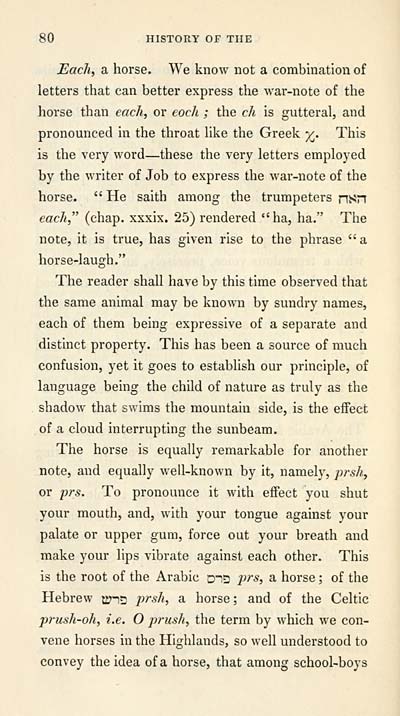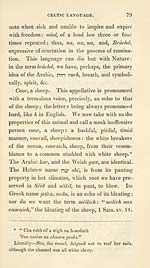Download files
Complete book:
Individual page:
Thumbnail gallery: Grid view | List view

80 HISTORY OF THE
Each, a horse. We know not a combination of
letters that can better express the war-note of the
horse than each, or eoclt ; the ch is gutteral, and
pronounced in the throat like the Greek }/. This
is the very word — these the very letters employed
by the writer of Job to express the war-note of the
horse. " He saith among the trumpeters nsn
each," (chap, xxxix. 25) rendered " ha, ha." The
note, it is true, has given rise to the phrase " a
horse-laugh."
The reader shall have by this time observed that
the same animal may be known by sundry names,
each of them being expressive of a separate and
distinct property. This has been a source of much
confusion, yet it goes to establish our principle, of
language being the child of nature as truly as the
shadow that swims the mountain side, is the effect
of a cloud interrupting the sunbeam.
The horse is equally remarkable for another
note, and equally well-known by it, namely, prsh,
or prs. To pronounce it with effect you shut
your mouth, and, with your tongue against your
palate or upper gum, force out your breath and
make your lips vibrate against each other. This
is the root of the Arabic d")D prs, a horse ; of the
Hebrew y;-i5 prsh, a horse ; and of the Celtic
prush-oh, i.e. O prush, the term by which we con-
vene horses in the Highlands, so well understood to
convey the idea of a horse, that among school-boys
Each, a horse. We know not a combination of
letters that can better express the war-note of the
horse than each, or eoclt ; the ch is gutteral, and
pronounced in the throat like the Greek }/. This
is the very word — these the very letters employed
by the writer of Job to express the war-note of the
horse. " He saith among the trumpeters nsn
each," (chap, xxxix. 25) rendered " ha, ha." The
note, it is true, has given rise to the phrase " a
horse-laugh."
The reader shall have by this time observed that
the same animal may be known by sundry names,
each of them being expressive of a separate and
distinct property. This has been a source of much
confusion, yet it goes to establish our principle, of
language being the child of nature as truly as the
shadow that swims the mountain side, is the effect
of a cloud interrupting the sunbeam.
The horse is equally remarkable for another
note, and equally well-known by it, namely, prsh,
or prs. To pronounce it with effect you shut
your mouth, and, with your tongue against your
palate or upper gum, force out your breath and
make your lips vibrate against each other. This
is the root of the Arabic d")D prs, a horse ; of the
Hebrew y;-i5 prsh, a horse ; and of the Celtic
prush-oh, i.e. O prush, the term by which we con-
vene horses in the Highlands, so well understood to
convey the idea of a horse, that among school-boys
Set display mode to: Large image | Transcription
Images and transcriptions on this page, including medium image downloads, may be used under the Creative Commons Attribution 4.0 International Licence unless otherwise stated. ![]()
| Early Gaelic Book Collections > Blair Collection > History of the Celtic language > (86) |
|---|
| Permanent URL | https://digital.nls.uk/76179555 |
|---|
| Description | A selection of books from a collection of more than 500 titles, mostly on religious and literary topics. Also includes some material dealing with other Celtic languages and societies. Collection created towards the end of the 19th century by Lady Evelyn Stewart Murray. |
|---|
| Description | Selected items from five 'Special and Named Printed Collections'. Includes books in Gaelic and other Celtic languages, works about the Gaels, their languages, literature, culture and history. |
|---|

